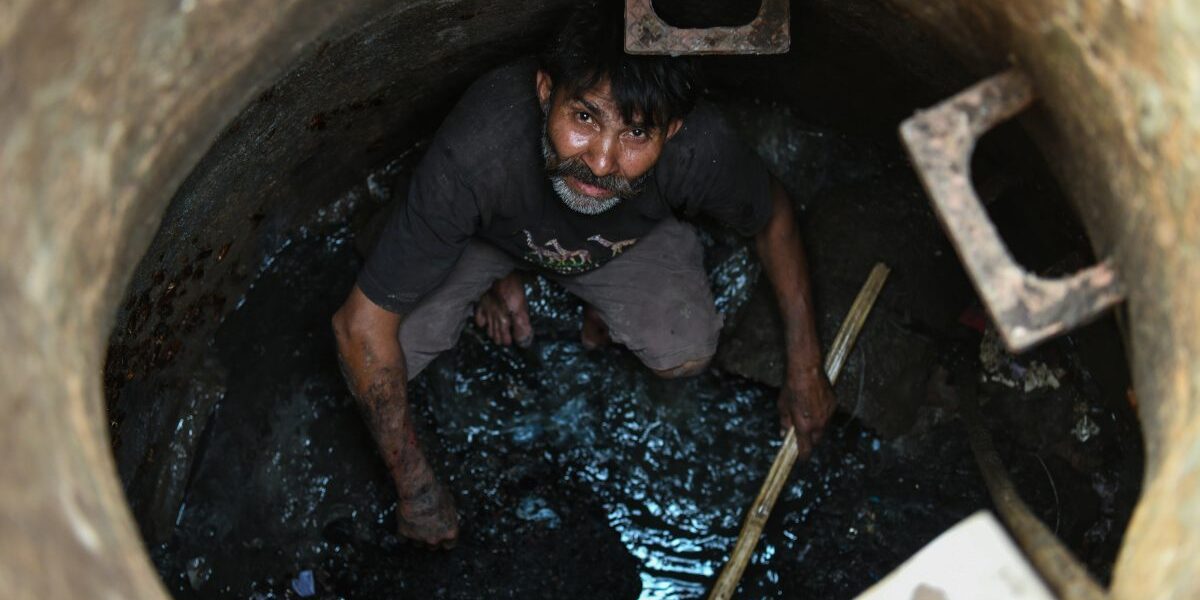
“In the rainy season, she began, it is really bad. Water mixes
with the shit and when we carry it on our heads, it drips from the
baskets on to our clothes, our bodies, our faces. When I return home, I
find it difficult to eat food sometimes. The smell never gets out of my
clothes, my hair.
But then in summer there is often no water to wash your hands
before eating. It’s difficult to say which is worse.” – Mari Marcel
Thekaekara, Endless Filth: The Saga of the Bhangis (2002)1
JUSTICE, social, economic and political; […] are
the words enshrined in the Preamble of the Indian Constitution.
Regrettably, the quotidian engagement by the lower castes in manual
scavenging punctures the high ideals of our constitution. Meena Gopal
notes that “manual 2 scavenging is the worst manifestation of
the ideology engendered by the caste system, while also being a highly
gendered occupation.” In intersectional feminism, it is important to
scrutinise this practice as it mixes class, caste and gender in an
oppressive manner. The paper hopes to open the debate to eliminate this
practice from a feminist standpoint.
Therefore, the paper is organised in two parts. Part I seeks to
understand the intricacies of class, caste and gender in the
continuation of this morally repugnant practice. Part II aims to find
ways to obliterate this institution from its core.
Part I: Manual Scavenging: An Unending Nightmare
“Today, 90 per cent Indians have toilet facility, which was only
40 per cent before 2014. Over 4.15 lakh villages, 430 districts, 2,800
towns, 19 states and Union Territories have been declared open
defecation-free,” – PM Narendra Modi
In this euphoria of construction of toilets, one forgets the role of
caste and gender in the cleaning of toilets. Dr B.R. Ambedkar explains “In
India, a man is not a scavenger because of his work. He is a scavenger
because of his birth irrespective of the question whether he does
scavenging or not.”
According to data by the National Commission for Safai Karamcharis,
since January 2017, 123 workers have died while engaging in acts of
manual scavenging. How can we all be so 3 indifferent? It
comes out of rigidities of caste and gendered systems. Around 90 % of
manual scavengers are women. Gopal records that “the avoidance of
excreta as polluting and distancing oneself from it is a privilege that
upper castes have arrogated to themselves, as they do with all other
bodily fluids and wastes, be it placenta, blood or spit. Therefore, who
else can manage it but those castes that anyway perform the cleansing of
these polluting substances? (Ramaswamy 2005).” (Gopal 2013) In a study
done in Ghazipur district of Uttar Pradesh, one finds the severe
economic conditions of manual scavengers. They live on the outskirts of
the district with a high prevalence of alcoholism and drug addiction.
The social stigma attached to this occupation limits young generation’s
access to other jobs. (Singh 2009)
In my work at the Centre for Social Equity and Inclusion (CSEI) with
Valmikis (SCs) in West Delhi. The practice of manual scavenging is an
intergenerational hereditary occupation. In one of my interactions with
Anjali [Names Changed], she reluctantly told us about the horrors of
untouchability associated with the garbage collection and how she got
into the occupation. Most of the garbage collection was done by women,
it was intergenerational and all of them belonged to the Dalit
communities. I could see the unholy alliance of class, caste and gender
in our everyday life.
The Parliament outlawed manual scavenging in 1993 and put forth strong
amendments in 2013 law. It was included as one of the atrocities under
Scheduled Caste and Scheduled Tribe (Prevention of Atrocities) Act,
1989. Surprisingly, the total violations have been ‘zero.’ It’s
horrifying as Indian Railways have been the biggest employer of manual
scavengers. When the state is complicit in this illegal act, how can one
expect society to change? Human Rights Activist Bezwada Wilson says
“There is no political will to implement the law.” Clearly, the legal
remedies have failed us.
Let’s look at the executive intervention by the Uttar Pradesh
Government. An analysis of Safai Karmi Scheme by Tulika Tripathi shows
deep-rooted caste and gender hierarchies. In this scheme, the Uttar
Pradesh Government converted cleaning jobs into full-fledged government
jobs with perks to break caste stereotypes with sanitation. Bhangis are
the dominant scavenging caste in this region. Corollary should be a high
representation of Bhangis. However, the story gets complicated. Most of
the jobs were taken by non-Bhangi castes with representation from upper
castes and OBCs (Other Backward Classes) also. But, in practice, the
upper castes were
not performing cleaning tasks. They ‘outsourced’ the job informally to
Bhangis. There were also differentiated cleaning arrangements for upper
caste and OBCs localities. The upper caste Safai Karmis were reluctant
to go to lower caste localities. Another important aspect was the
representation of women in the jobs. It was less than 15% overall with
Bhangi women representing meagre 1%. The study concluded that the scheme
had increased discrimination with notions of purity and pollution still
intact amongst socially dominant groups. (Tripathi 2012)
Till now, we see how class, caste and gender intertwine amongst each
other. The next section looks at the processes to end this alliance
using theories of Dalit-Bahujan Feminism; modern technology;
reimagination of sanitation and toilet etiquette. We shall also look at
how different societies have dealt with this.
Part II: The Annihilation of Manual Scavenging
Since most of the scavenging work is done by Dalit women, we need to
make it a feminist issue. In its practice, the oppression unleashed on
Dalit women is atrocious. However, ‘mainstream’ feminism has not made it
a rallying cry. Gopal Guru notes that “Social location which determines
the perception of reality is a major factor[…] make the
representation of dalit women’s issues by non-dalit women less valid and
less authentic.” (Guru 1995) Lata Pratibha Madhukar, Dalit-Bahujan
Feminist Scholar, argues that “While other feminisms frame their
analysis on the basis of sexuality and patriarchy, Dalit-Bahujan
feminist thought articulate the primacy of caste, class and gender in
the Indian context.” Hence, the feminist struggle against manual
scavenging requires a different theoretical framework.
Acknowledging the caste equation in this matrix, the immediate
solution is the mechanisation of the ‘kill chain’ (Manual Scavenging,
Drain Cleaning and Sanitation Work). The mechanisation can only work if
the policy explicitly notes the engagement of caste-gender dynamic. The
problem is not uniquely located in India. Pakistan and Bangladesh also
grapple with manual scavenging. However, we can learn from Japan,
Singapore and Malaysia. In Malaysia, the push for mechanisation came
from the Government to make Malaysia tourist friendly. The process
involved subsidies, outreach programmes and mass awareness. New pieces
of equipment were introduced with technological advancements. Other
countries have done it, the question arises why can’t India?
We need to destigmatise the sanitation regime in India. Dr Ambedkar
argued in favour of inter-caste marriage to break the caste system.
Adding to this, I think we need to make sanitation curriculum mandatory
in schools and higher education institutions to annihilate the stigma
attached with toilet cleaning. Japan shows the way. I think in the
pantheon of Hindu Gods, we need to find a God for the toilet like in
Japan. There are apps for public toilets, museums, songs, sanitation
curriculum and Japan Toilet Prize. Toilets are a feminist issue in
Japan. The Indian politicians use the rhetoric of ‘honour’ which is
problematic rather the language should be of advancement. Again, it is
not an argument against the social realities of India. We need to ensure
the feminisation of political communication.
In terms of toilet etiquette, we can learn from the Japanese school
system. Gakko Soji (school cleansing) is rooted in Buddhist teachings.
In India, we should prepare a cleanliness manual keeping in mind class,
caste and gender. This exercise should not follow Safai Karmi Scheme of
UP. Strict Enforcement and Monitoring is required. We have done with
affordable medicines, software and service industry. Why can’t India
show the way to under-developed nations to solve hygiene problem? Where
are the Indian entrepreneurs, research and development centres, PhD
scholars, feminists, sociologists? Why can’t we turn this into an
opportunity to break shackles of caste-gender hierarchies in India?
We need creative sanitation mechanisms with the help of Dalit-Bahujan
feminist thought; modern technology; Japan and Malaysia Governments’
roadmaps and strict implementation of the Prohibition of Manual
Scavenging Act, 2013. We need to make a theoretical framework to counter
the rhetoric of purity and pollution.
Consequently, the Indian Society owes an apology to millions of
families who have toiled and suffered in this oppressive regime. We can
only redeem ourselves by the annihilation of manual scavenging bit by
bit. In the destruction of manual scavenging, we hope to eliminate
barbarity, brutality and banality of indifference of upper castes to the
evils of Caste System, Untouchability, Gender Discrimination and
Economic Inequality.
Till then, Manual Scavenging will remain a moral crime…
About The Author
Photo Credits : CHANDAN KHANNA/AFP/Getty Images
1 Ravichandran, B. 2011. “Scavenging Profession: Between Class and Caste?” Economic and Political Weekly 46 (13): 21–25.
2 Meena, Gopal 2013. “Ruptures and Reproduction in Caste/Gender/Labour:” Economic and Political Weekly Vol. 48, Issue No. 18, 04 May, 2013
3https://scroll.in/article/895013/how-do-other-countries-clean-their-sewers-and-is-there-something-india-c an-learn-from-them
● Guru, Gopal. 1995. ‘Dalit Women Talk Differently’, Economic and Political Weekly. October 14-21, pp 2548-49.
● Meena, Gopal 2013. “Ruptures and Reproduction in Caste/Gender/Labour:” Economic and Political Weekly Vol. 48, Issue No. 18, 04 May, 2013
THE ANNIHILATION OF MANUAL SCAVENGING IN INDIA Guglani | 7
● Ravichandran, B. 2011. “Scavenging Profession: Between Class and Caste?” Economic and Political Weekly 46 (13): 21–25.
● Singh, Rajeev Kumar. 2009. “Manual Scavenging as Social Exclusion: A Case Study.” Economic and Political Weekly 44 (26/27): 521–523.
● Tripathi, Tulika. 2012. “Safai Karmi Scheme of Uttar Pradesh: Caste Dominance Continues.” Economic and Political Weekly 47 (37): 26–29.
Web Links
● Chandran, Rina. (2016, March 3). Reuters.com. “India’s female scavengers enslaved by caste, gender discrimination” Retrieved from
https://www.reuters.com/article/us-india-scavenging-women/indias-female-scavengers-en
slaved-by-caste-gender-discrimination-idUSKCN0W503U
● Dayman, Lucy. (2017, December 09). Theculturetrip.com. “Inside Japan’s Toilet Obsessed Culture” Retrieved from
https://theculturetrip.com/asia/japan/articles/inside-japans-toilet-obsessed-culture/
● Dey, Abhishek. (2017, September 01). Scroll.in. “Can Delhi really implement its plan to fully mechanise drain and sewer cleaning?” Retrieved From:
https://scroll.in/article/848892/can-delhi-really-implement-its-plan-to-fully-mechanise-dr ain-and-sewer-cleaning
● Fifield, Anna. (2015, December 15). “How Japan’s toilet obsession produced some of the world’s best bathrooms.” The Washington Post. Retrieved from
THE ANNIHILATION OF MANUAL SCAVENGING IN INDIA Guglani | 8
https://www.washingtonpost.com/news/worldviews/wp/2015/12/15/how-japans-toilet-ob
session-produced-some-of-the-worlds-best-bathrooms/?noredirect=on&utm_term=.da106
6b9ea60
● Kumar, Shonottra and Srivastava, Sumeysh. (2018, September 29). The Wire. “For Manual Scavengers, Swachhta Is Not Seva.” Retrieved from
https://thewire.in/caste/manual-scavengers-swachh-bharat-abhiyan
● Lalwani,Vijayta. (2018,September 23). Scroll.in “How do other countries clean their sewers and is there something India can learn from them?” Retrieved
from:
https://scroll.in/article/895013/how-do-other-countries-clean-their-sewers-and-is-there-so
mething-india-can-learn-from-them
● Madhukar Pratibha, Lata. (2015, May 8). Roundtableindia.co.in. “On Sharmila Rege’s First Death Anniversary, a Satyashodhak Review of her Last Book” Retrieved
from
https://roundtableindia.co.in/index.php?option=com_content&view=article&id=8177:sile
nced-by-manu-and-mainstream-feminism-dalit-bahujan-women-and-their-history&catid=
120:gender&Itemid=133
● Web Desk, India Today. (2018, May 6). IndiaToday.in. “Students in Japan clean their own classrooms and school toilets and the reason is incredible.” Retrieved
from
https://www.indiatoday.in/education-today/featurephilia/story/students-in-japan-clean-the
ir-own-classrooms-and-school-toilets-and-the-reason-is-incredible-1227619-2018-05-06





You can definitely see your expertise within the article you write.
The sector hopes for more passionate writers such as you who aren’t
afraid to mention how they believe. Always follow your heart.
Thanks for sharing your ideas on this blog. Also, a fairy tale regarding the financial institutions intentions when talking about home foreclosure is that the lender will not getreceive my repayments. There is a degree of time the bank will take payments here and there. If you are way too deep in the hole, they may commonly demand that you pay the actual payment in full. However, i am not saying that they will not take any sort of installments at all. When you and the standard bank can find a way to work anything out, this foreclosure procedure may stop. However, in case you continue to miss out on payments in the new approach, the foreclosure process can just pick up exactly where it left off.
My partner and I stumbled over here coming from a different page and thought I should
check things out. I like what I see so i am just following you.
Look forward to looking over your web page yet again.
Awesome blog you have here but I was wondering if you knew of
any community forums that cover the same topics talked about in this article?
I’d really like to be a part of group where I can get comments from other experienced people that share the same interest.
If you have any recommendations, please let me know. Thanks!
Hi! I realize this is somewhat off-topic however I had to ask.
Does managing a well-established website like yours require a lot of work?
I’m completely new to blogging but I do write in my diary every day.
I’d like to start a blog so I can easily share my experience and thoughts online.
Please let me know if you have any suggestions or tips for brand new aspiring blog owners.
Appreciate it!